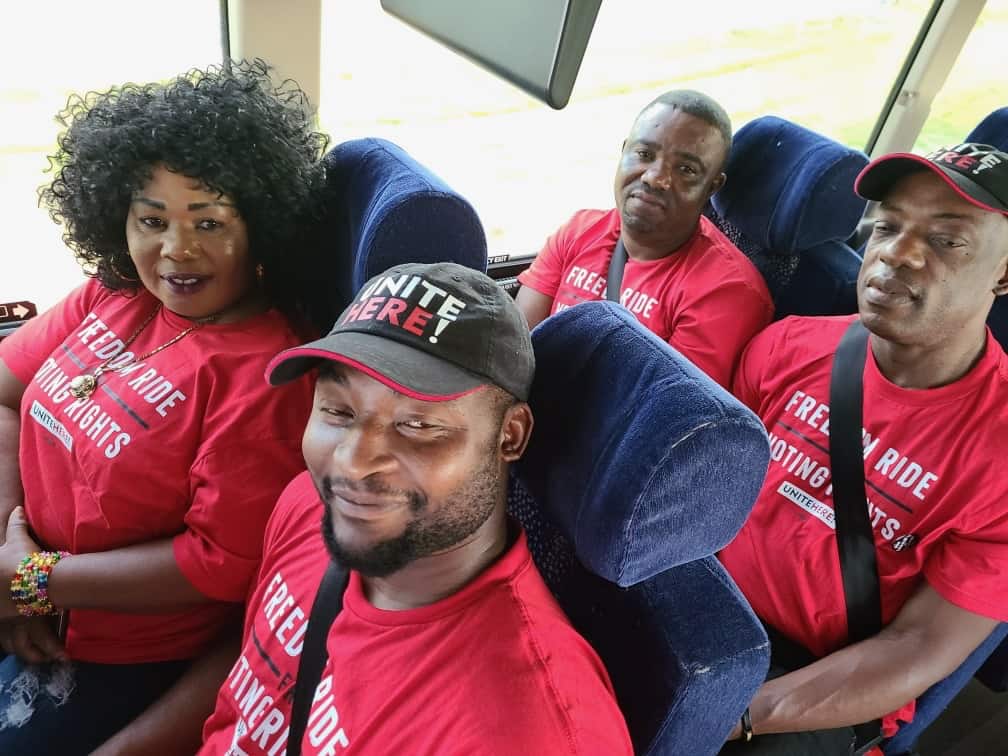
Tascha Shahriari-Parsa is a government lawyer enforcing workers’ rights laws. He clerked on the Supreme Court of California after graduating from Harvard Law School in 2024. His writing on this blog reflects his personal views only.
Hundreds of union members kicked off the “For the People” Freedom Ride today in Arizona in support of the For the People Act, a federal bill that would expand voting rights by reducing partisan gerrymandering, reducing the influence of money in politics, and addressing barriers to voter access in elections. The Freedom Ride will first drive through Santa Rosa, New Mexico to Tulsa, Oklahoma to celebrate the first annual Juneteenth holiday with a ceremony commemorating the hundredth anniversary of the Tulsa Massacre. From there, the Freedom Ride will follow the route of the Freedom Riders of 1961 through the South, joining with Black Voters Matter and ending in Washington, D.C.
By starting in Arizona, the Freedom Ride is especially calling the attention of Arizona Senator Krysten Sinema, one of two Democrats who have yet to endorse ending the Filibuster, which may currently be the only way to pass voting rights reform—as well as major labor law reform—in the Senate. “We want her to know that the people of Arizona, the people in the country, really care about this issue,” said the co-president of Unite Here Local 11, “so that’s why we’re starting in Arizona.”
A massive shortage in computer chips has been having a considerable effect on workers in the restaurant industry. Computer chips are used in “point of sale” or POS machines that transmit data from server’s handheld devices to the kitchen. Without these chips, servers taking customers’ orders have to run in to the kitchen to deliver their order, slowing down service time. The shortage could thus encourage more restaurants to rely on contactless ordering, such as through scannable QR codes glued to dining tables. As a result, the computer chips shortage may speed up a loss of jobs in the restaurant industry as the work of servers and bartenders are replaced by these automated systems.
Plans to permanently reduce staff have also been underway at hotels chains across the country, many of which have been considering getting rid of services like free breakfasts and daily room cleanings to cut costs and increase profit margins. In a report, Unite Here estimates that 39% of all cleaning jobs in hotels might never return. “Housekeeping jobs are the backbone of the service economy,” said Unite Here President D. Taylor, “and taking these jobs away means that many working families and especially communities of color might never recover.”
On Saturday, thousands of teachers protested across the country against attempts to restrict what teachers can teach in at least 15 States, especially on issues of race and gender. This comes as some conservative parents’ groups have even advocated that teachers should wear body cameras to ensure that they are not teaching about social justice. One of the many teachers’ unions that has pushed back is the Westerly Education Association of Rhode Island, which published a statement supporting honesty and diversity in education, and affirming that they “are for truth-telling and uplifting the power of organizing and solidarity that moves us towards a more just society.” Questions have also been raised about whether teachers would be protected by the First Amendment if they choose to teach subjects in contravention of the laws recently passed around the country.
The UNICEF and ILO report that child labor has risen globally to 160 million, and warns that numbers will continue to rise as global progress against child labor has stagnated for the last 5 years. The report urges immediate steps, including: extending social protection for children and their families; ensuring free and good-quality schooling; promoting decent work that delivers a fair income for young people of legal working age to help families escape from child labor driven by poverty; ensuring strong legal protections for children; and addressing gender norms and discrimination that contribute to girls’ performance of unpaid domestic work.
On Thursday, in California v. Texas, the U.S. Supreme Court held in a 7-2 decision that Republican states did not have standing to challenge the individual mandate provision of the Affordable Care Act, which imposes a tax penalty on individuals without health insurance. The individual mandate was intended to avoid a ‘death spiral’ of individuals only purchasing health insurance once they are sick and thus raising the cost of health insurance. Under the Trump administration, the tax penalty was reduced to $0, leading Texas and other states to challenge the mandate as an unconstitutional exercise of taxing power, since the mandate generated no tax revenues. The case made its way to the Supreme Court, which on Thursday declared, without deciding the constitutionality of the provision, that Texas and other plaintiffs did not have standing to challenge the provision. In an opinion by Justice Breyer, the court held that Texas and other states’ alleged injuries—greater costs to run state-operated medical insurance programs allegedly resulting from more people enrolling in these programs because of the individual mandate as well as greater administrative expenses allegedly resulting from the ACA’s individual mandate—were not fairly traceable to the ACA. The court concluded that Texas had failed to demonstrate that the individual mandate caused more individuals to enroll in state-run medical programs, and noted that the administrative costs pleaded by the State arise out of other provisions of the ACA and thus cannot be fairly traced to the individual mandate.






Daily News & Commentary
Start your day with our roundup of the latest labor developments. See all
February 16
BLS releases jobs data; ILO hosts conference on child labor.
February 15
The Office of Personnel Management directs federal agencies to terminate their collective bargaining agreements, and Indian farmworkers engage in a one-day strike to protest a trade deal with the United States.
February 13
Sex workers in Nevada fight to become the nation’s first to unionize; industry groups push NLRB to establish a more business-friendly test for independent contractor status; and UFCW launches an anti-AI price setting in grocery store campaign.
February 12
Teamsters sue UPS over buyout program; flight attendants and pilots call for leadership change at American Airlines; and Argentina considers major labor reforms despite forceful opposition.
February 11
Hollywood begins negotiations for a new labor agreement with writers and actors; the EEOC launches an investigation into Nike’s DEI programs and potential discrimination against white workers; and Mayor Mamdani circulates a memo regarding the city’s Economic Development Corporation.
February 10
San Francisco teachers walk out; NLRB reverses course on SpaceX; NYC nurses secure tentative agreements.